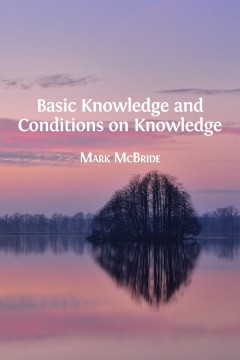Filter by

Recent Advances in Knowledge Management
Recent Advances in Knowledge Management investigates the multidimensional aspects of knowledge management by exploring different perspectives and practices as well as existing theories of effective knowledge management in a changing world. Chapters address such topics as tacit knowledge, knowledge management frameworks, informally structured domains of knowledge management, and more. Beyond und…
- Edition
- -
- ISBN/ISSN
- 9781839699443
- Collation
- xiv, 178 p. : ill.
- Series Title
- -
- Call Number
- 658.4038 MOH r

Interdisciplinarity in the Scholarly Life Cycle : learning by example in huma…
This open access book illustrates how interdisciplinary research develops over the lifetime of a scholar: not in a single project, but as an attitude that trickles down, or spirals up, into research. This book presents how interdisciplinary work has inspired shifts in how the contributors read, value concepts, critically combine methods, cope with knowledge hierarchies, write in style, and coll…
- Edition
- 1
- ISBN/ISSN
- 9783031111082
- Collation
- xvi, 337p. : ill.
- Series Title
- -
- Call Number
- 820.90001 INT i

Industry 4.0 for SMEs - smart manufacturing and logistics for SMEs
In recent years, the industrial environment has been changing radically due to the introduction of concepts and technologies based on the fourth industrial revolution, also known as Industry 4.0. After the introduction of Industry 4.0 in large enterprises, SMEs have moved into the focus, as they are the backbone of many economies. Small organizations are increasingly proactive in improving thei…
- Edition
- -
- ISBN/ISSN
- 9783039365685
- Collation
- ix, 336p.; ill.
- Series Title
- -
- Call Number
- 338.04 IND i

Technologies and applications for big data value
This open access book explores cutting-edge solutions and best practices for big data and data-driven AI applications for the data-driven economy. It provides the reader with a basis for understanding how technical issues can be overcome to offer real-world solutions to major industrial areas. The book starts with an introductory chapter that provides an overview of the book by positioning the …
- Edition
- -
- ISBN/ISSN
- 9783030783075
- Collation
- xxiv, 544p.; ill.
- Series Title
- -
- Call Number
- 005.7 TEC t

Rethinking urban risk and resettlement in the global South
Environmental changes have significant impacts on people’s lives and livelihoods, particularly the urban poor and those living in informal settlements. In an effort to reduce urban residents’ exposure to climate change and hazards such as natural disasters, resettlement programmes are becoming widespread across the Global South. While resettlement may reduce a region’s future climate-rela…
- Edition
- -
- ISBN/ISSN
- 9781787358287
- Collation
- xvi, 366p.; ill.
- Series Title
- -
- Call Number
- 307.76091724 RET j

Basic knowledge and conditions on knowledge
How do we know what we know? In this stimulating and rigorous book, Mark McBride explores two sets of issues in contemporary epistemology: the problems that warrant transmission poses for the category of basic knowledge; and the status of conclusive reasons, sensitivity, and safety as conditions that are necessary for knowledge. To have basic knowledge is to know (have justification for) some …
- Edition
- -
- ISBN/ISSN
- 9781783742851
- Collation
- vii, 228p.
- Series Title
- -
- Call Number
- 121 MAR b

Movement of knowledge : medical humanities perspectives on medicine, science,…
Medical knowledge is always in motion. It moves from the lab to the office, from a press release to a patient, from an academic journal to a civil servant’s desk and then on to a policymaker. Knowledge is deconstructed, reconstructed, and transformed as it moves. The dynamic, ever-evolving nature of medical knowledge has given rise to different concepts to explain it: diffusion, translation, …
- Edition
- -
- ISBN/ISSN
- 9789188909367
- Collation
- 261 p.
- Series Title
- -
- Call Number
- 610.1 HAN m

The right to science : then and now
That everyone has a human right to enjoy the benefits of the progress of science and its applications comes as a surprise to many. Nevertheless, this right is pertinent to numerous issues at the intersection of science and society: open access; 'dual use' science; access to ownership and dissemination of data, knowledge, methods and the affordances and applications thereof; as well as the role …
- Edition
- -
- ISBN/ISSN
- 9781108478250
- Collation
- xii, 324 p. ; ill
- Series Title
- -
- Call Number
- 342.0853 POR t
Knowledge for Governance
This open access book focuses on theoretical and empirical intersections between governance, knowledge and space from an interdisciplinary perspective. The contributions elucidate how knowledge is a prerequisite as well as a driver of governance efficacy, and conversely, how governance affects the creation and use of knowledge and innovation in geographical context. Scholars from the fields of …
- Edition
- -
- ISBN/ISSN
- 9783030471507
- Collation
- -
- Series Title
- -
- Call Number
- 320 KNO k

Harnessing knowledge, innovation and competence in engineering of mission cri…
This book explores the critical role of acquisition, application, enhancement, and management of knowledge and human competence in the context of the largely digital and data/information dominated modern world. Whilst humanity owes much of its achievements to the distinct capability to learn from observation, analyse data, gain insights, and perceive beyond original realities, the systematic tr…
- Edition
- -
- ISBN/ISSN
- 9781789844672
- Collation
- XIII, 177 p.
- Series Title
- -
- Call Number
- 658.4038 HAR h
 Computer Science, Information & General Works
Computer Science, Information & General Works  Philosophy & Psychology
Philosophy & Psychology  Religion
Religion  Social Sciences
Social Sciences  Language
Language  Pure Science
Pure Science  Applied Sciences
Applied Sciences  Art & Recreation
Art & Recreation  Literature
Literature  History & Geography
History & Geography